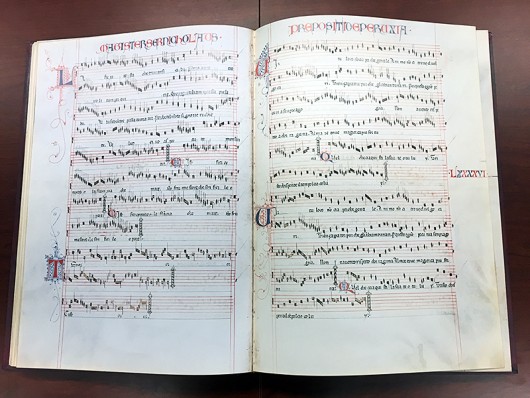Before radio turned out pop hits left and right, paper and pen advancements in the 1300s led to an increase in song notation.
Graeme Boone, director of the Center for Medieval and Renaissance Studies and professor of music, recently wrote a paper on the advancements of musical notation. Boone shared his knowledge at a lecture in 18th Avenue Library on Monday.
“The development of paper industries in the 14th century encourages an attitude toward writing, which is increasingly broad that includes different types of writing, especially informal writings,” Boone said in an interview prior to the lecture.
Boone said that this leads to an increase of using new ways to write.
Before the development of paper, he said musicians wrote down their musical ideas on parchment that is more expensive than paper. The development of paper, on the other hand, encourages people to write down their musical notations more frequently because it is cheaper.
“Writing down the music becomes more personal and informal, and it becomes more common for different types of people to start writing down music,” Boone said.
As more and more people wrote music down, according to Boone, the way of writing music notations became more complex and new forms needed to be invented.
Traditionally, black notes were used for chant music. Thus, not all musicians accepted this notation change because they felt white notes lacked a sense of authority.
“Some of the leading musical thinkers of the day don’t want this (color shifting) to happen because to use white notes is to ignore the great tradition of black notes,” Boone said.
Nevertheless, throughout the 1400s, white notation had taken the majority of music notations regardless of its controversial views.
The change in the musical notation does not affect music performance itself.
Advanced print technology and simplicity of void notes do however allow people to write down their thoughts immediately.
“It really does affect the way that people can use writing to make music,” Boone said. “By making it easier to write notes (and) by making it more common, you are allowing people to store their thoughts in writing more easily and to think more quickly and complexly in writing.”
The topic of this lecture was very creative and important as most people focus on aural differences when discussing music revolution, but they ignore the fact that writing is another invisible step of composing.
“Thinking about notation being filled versus not filled is also very interesting,” said Austin McCabe Juhnke, a fourth-year PhD in musicology. “It would definitely have some implications for people who are performing music from this era, and scholars who are wanting to make editions of these kind of music.”



